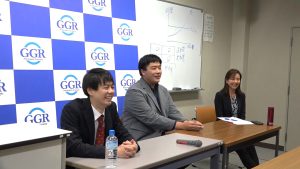The Institute for Global Governance Research (GGR) hosted a talk session on June 23, 2022, featuring two recent Hitotsubashi University alumni who are well versed in political science and methodology, Yuji Masumura and Dongwen Wu. The two discussed with moderator Professor Maiko Ichihara and over 50 participants how political and social science can be utilized in research and employment.
Directly after finishing the undergraduate program at the Faculty of Law, Mr. Masumura entered the doctoral program at the University of Texas at Austin, specializing in international relations and security studies. Specifically, he has studied the Security Council and states’ cognition concerning their status, and has worked with quantitative analysis, including text analysis, topic models, or survey experiments. He currently has several ongoing research projects, some of which are collaborative. Mr. Wu has an outstanding knowledge of quantitative analysis and is currently working as a data scientist at dip Corporation in Japan. He has used polimetrics in practice, for example in identifying the causal relationship between the number of applicants for a certain service and advertisements.
First, regarding the strengths and weaknesses of their own research fields, both of these professionals are deeply aware of their own position in the field as a whole. Mr. Masumura mentioned that the strengths of econometric analysis are statistical causal inference and transparency, and the weakness is that the results do not always match the practitioners’ sense of reality, especially in light of growing awareness of causal inference in the United States. Given that many computer scientists in the company have strengths in forecasting and classification, Mr. Wu argued that the strengths of polimetrics are causal inference and its high applicability to practice, especially when compared to econometrics, and its weakness is its slow response to new fields, such as big data, applications, or estimation and partial recognition.
Regarding ingenuity in conducting research, the session provided a glimpse into the attitude to challenge that both presenters have held since they were undergraduates. Mr. Wu double majored in diplomacy and economics at National Chengchi University in Taiwan, and studied abroad at Hitotsubashi University for a year as an undergraduate. He learned about R (programming language) through a class in international relations while studying abroad, and also took advanced econometrics in his master’s program at graduate school. Mr. Masumura also voluntarily began studying statistical analysis as an undergraduate, and actually organized a study group on R. He was able to make great strides in learning from other students.
Finally, a discussion ensued on how to apply political and social science or methodology after graduation. Mr. Wu advised that a deep understanding of programming languages is a great advantage, especially if one is looking for a job in data science. Mr. Masumura pointed out the importance of “not being afraid to go off the rails.” In other words, having the courage to try without fear, even if you are a little different from those around you. He then stated that in order to have courage, one should seek out people whose interests are close to one’s own.
Other quotes:
We also introduce other notable quotes in the following list:
■Mr. Masumura
- [Regarding the weakness that research results do not always match the practitioners’ sense of reality.] In research, there is a data-generating process that creates a sense of reality, and I think that the differences from the reality found with this process is one of the signals that there are interesting but missing parts.
- [Regarding the necessary conditions for becoming a researcher.] One is English, and the other is to find what you want to research. The way to do that is to always watch the news and go find out what is different from the theories.
- [On how to deepen your study abroad experience.] I think it is important to learn not only at the university, but also on a daily life level. I hope that you will have many friends and that you will also value the sensibility through the experience of being a minority among them.
■Mr. Wu
- [Causal inference] is, I think, an advantage that econometrics and econometrics have over computer science.
- [Regarding communication in practice.] To persuade people who have not studied econometrics or econometrics, the best way is to show them easy-to-understand counter-examples.
- [On how to deepen your study abroad experience.] Do things that you can only do abroad. [In the context of having friends and traveling around Japan.] The other day I rode my bicycle from Kokubunji to Yokohama station
【Event report prepared by】
HIJIKATA Yuji (Master’s student, School of International and Public Policy, Hitotsubashi University)

